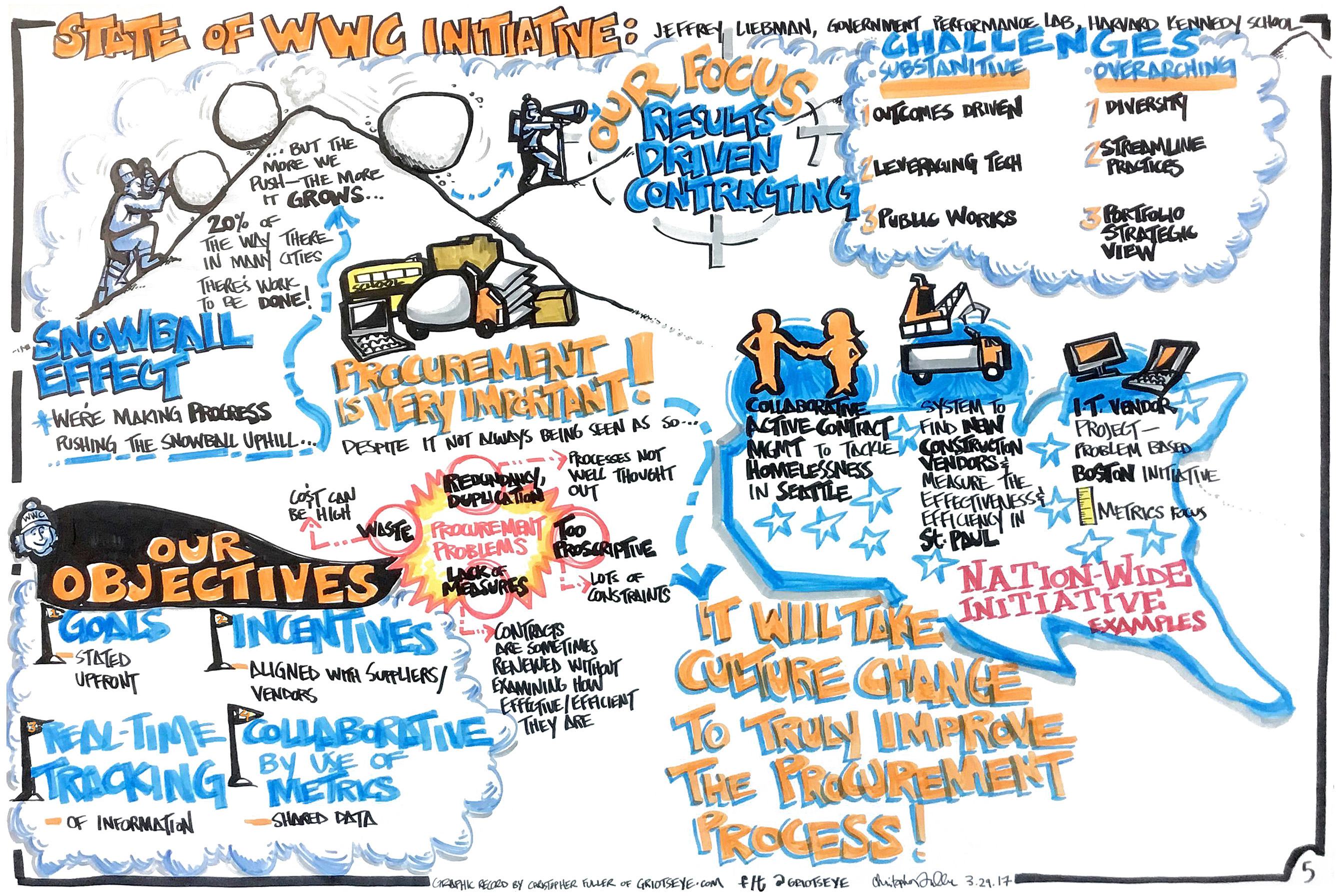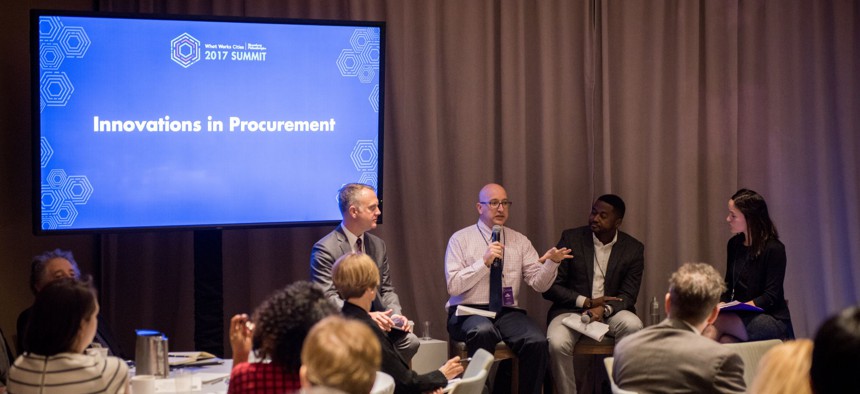Connecting state and local government leaders
Top insights about procurement and contracting from the What Works Cities Summit.
Earlier this month, 350 leaders from 91 cities met in New York City for Bloomberg Philanthropies’ What Works Cities (WWC) Summit to discuss how to improve outcomes for residents using data and evidence. The Harvard Kennedy School Government Performance Lab (GPL), which helps cities adopt results-driven contracting strategies through WWC, moderated several panels during which we took the opportunity to ask city leaders how they leverage procurements to advance on their cities' priorities. Here are the some of the most interesting ideas that came up in those conversations:
1. Procurement and data can be powerful tools especially if there is a clear connection to people’s lives. This video , which premiered at the Summit and explains how results-driven contracting can make a difference in the lives of people experiencing homelessness, drove home a key lesson. Data can be crucial for pinpointing the specific needs of a population, shedding light on whether existing services are meeting those needs, and devising strategies for improving services. But to create positive feedback loops in which citizens reward city officials who use data to improve services, cities need to communicate how data-informed programmatic changes tie to individual lives.
2. Transforming the culture around procurement. During one of our panels, a chief procurement officer from a Southern city observed that this was the first event he has attended where people think it is cool that he is involved in procurement: “Usually when I tell people I work on procurement, they say ‘ugh.’” Contracting represents a tremendous missed opportunity for cities—instead of treating it as an afterthought or an administrative burden, cities need to use procurement as a strategic tool for identifying the best private and non-profit sector partners to help them solve the hardest problems they face and achieve their highest priority objectives. To realize the potential of procurement, cities need to change the culture around procurement work. Senior leaders need to treat procurement positions as high-impact roles in city government; procurement staff need to recognize their responsibility in driving innovation and performance; and programmatic staff need to engage procurement staff early—when defining the goals of a procurement—and consult with them about how to best structure the procurement to align incentives toward those objectives.
3. Rotating staff between programmatic and procurement functions. We noticed that several of the most innovative procurement officers came to their positions from non-procurement roles. Because of their prior programmatic experience, they appeared to be particularly attuned to how procurement could be used to help agencies accomplish their missions and particularly willing to reject “but that is how we have always done things” arguments against reform. There is a broader lesson here about the potential to encourage fresh thinking and support professional development in the public sector by regularly rotating top civil servants into new roles.

4. “Business as usual can be the riskiest procurement approach.” This was our favorite line from the Summit, and it occurred in a discussion of IT purchases. Cities tend to be notoriously risk-averse when it comes to procurement. When they are not clear on the rules, they default to past practices and assume that new approaches that are not directly addressed in regulations are likely prohibited even though the law may provide considerable flexibility. As a result, staff often fail to consider new approaches. Yet "business as usual" practices can lead to missed opportunities. This is particularly true when purchasing technology, where an iterative and flexible product development approach that integrates input from end users and other stakeholders can be critical for success. Such an approach is contrary to the standard procurement process, which tends to be highly prescriptive upfront with little flexibility for vendors to inform RFP requirements or deviate from them during a contract term—even when more promising solutions are discovered.
5. Strategies for improving vendor diversity can enhance vendor experience and procurement outcomes more broadly. Strategies that are most effective for engaging specific segments of the vendor community, including tech start-ups or diverse vendors, actually benefit all vendors. For example, key tactics for improving vendor diversity include streamlining procurement processes, reducing bonding and insurance requirements, and accelerating payments. When the cost of doing business with a city is reduced, a wider range of vendors become interested. These changes appeal to all contractors, including those that are established, and they can attract more (and new) bidders to city procurements, improve competition, and thereby lower costs and improve outcomes for residents. We also heard interesting discussions of how cities are using technology to streamline processes for verifying that bidders meet vendor diversity requirements and how breaking up large contracts into smaller pieces can enable local businesses to compete for a greater share of contract dollars.
6. Open contracting data and community engagement to improve accountability of cities and vendors. Few cities publish accurate, user-friendly data on their contracts. Yet such information can help improve the results of city procurements. With information about the local market, vendors are better equipped to submit competitive responses to RFPs and form partnerships. This can result in increased vendor competition and more diverse vendor participation. Sharing contracting data publicly can also improve the quality of data internally and facilitate information sharing across cities regarding vendor performance and contract terms. Such transparency can help improve vendor selection and government’s negotiating position vis-à-vis vendors (vendors often have the advantage of knowing the terms other governments have accepted for a given good or service). Finally, open data can enhance accountability to residents, who have a right to know how the city spends their tax dollars and if there was real competition.
7. Providing a level playing field for new bidders. In a discussion of strategies for incorporating past performance into the scoring of bids, the question arose of how to avoid discouraging new entrants if current vendors receive points for past performance. A variety of solutions were discussed, including an approach from New York City that credits new entrants with the average score of similar past vendors.
8. Cities are far from the goal post when it comes to results-driven contracting but the work will get easier as progress is made. One panelist referred to the GPL's Results-Driven Contracting Continuum and said: "It would be a significant accomplishment if we could simply move from stage zero to stage one." While we have a lot of work left to do before all cities are managing all of their key procurements well, there is already exciting progress being made. Moreover, as we accumulate and spread more examples of best practices, create more networks between cities, and start to bring about a cultural change that elevates the status of procurement work, progress will snowball.

Jeffrey Liebman is the Malcolm Wiener Professor of Public Policy at Harvard University’s Kennedy School of Government, Director of the Taubman Center for State and Local Government, and the Director of the Kennedy School’s Government Performance Lab.
Special thanks to the panelists and participants in our Innovations in Procurement panels, who inspired this list of top procurement insights, especially Jason Johnson from Seattle, Abdoul Kabaou from Little Rock, Laura Melle from Boston, Jean Moreno from Glendale, Joel Neaveill from Louisville, and Kimberly Schmidt from Naperville.

NEXT STORY: Bill for ‘Sanctuary City’ Penalties Gains Steam at Texas State Capitol



